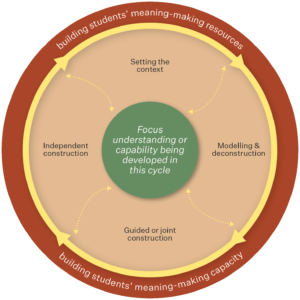Our approach
Why do our courses?
Students’ ability to use language to comprehend and compose the multitude of texts at all year levels and from all curriculum areas will determine their success in developing and demonstrating their learning. This is why all our courses place language and literacy at the very heart of teaching and learning.
By undertaking our courses, you will learn:
- how student literacy is a capacity for making meaning across the whole curriculum, predominantly through language and visuals
- the ways that language underpins learning
- teaching practices that address student literacy and learning needs in a holistic and explicit manner
- positive strategies for self-reflection and self-appraisal
- ways to develop collaborative working relationships with other teachers across subject areas
- how to pass on your new understanding and skills to your whole school.
Research has shown that implementing our courses can lead to significant improvement in students’ results.
What do students need to do with and through language?
As students begin schooling, they will be drawing on their commonsense understandings and experiences of their close and immediate world to make meaning in a range of contexts. As they move through school, they will be expected increasingly to read, write, listen and speak about content outside of this immediate, lived experience: content that deals with more technical, specialised and abstract curriculum knowledge.
At the same time, they broaden the range of contexts from those where they take on a narrow range of social roles as they interact mostly with familiar people to contexts where they take on the kinds of expert roles through which they can demonstrate and express their increasing knowledge. With this comes an increasing pressure to express their ideas in more complex and subtle ways. Students will need to become more conscious of how language is used to persuade and influence others’ actions.
This increasing complexity is also reflected in the shift from contexts where oral language is predominantly used to those where written language takes on an increasingly important role as students develop more technical and abstract knowledge. Here we see a movement from language accompanying action to language that reconstructs the action, giving the students the ability to generalise about phenomena, to reflect on human experience and to critique their own thinking and the thinking of others. In doing so, they will be much more conscious of how to organise texts coherently and cohesively.
How does knowledge about language help?
For students to become confident participants in this unfolding literacy landscape, they will need to build certain capacities in order to make effective and appropriate choices in any given context.
A key part of building these capacities is developing students’ awareness of how language works to make meaning. By explicitly focusing on the workings of texts of all kinds, students can gradually build their own repertoire of meaning-making resources as they come to understand the range of linguistic resources available and how they get taken up in any given context.
What model of language will assist us?
The model of language that underpins all our courses, the functional model of language, has proven to be an extremely useful framework for teaching and learning about language. It is concerned with how language varies according to the sociocultural contexts in which it is used. The model describes the choices available in the language system and how these are expressed at different levels of the language system.
How can teachers teach about language?
Our courses are premised on the belief that an explicit pedagogy around language is best undertaken within the context of cycles of teaching and learning, within which scaffolding at various levels can occur. In these cycles, the teacher has a clear understanding about the kind of language demanded in various teaching and learning activities and how this can help to make decisions about what to scaffold and how to go about doing it.
In any given teaching and learning cycle, assessment criteria should be explicit and shared by teachers and students. By establishing criteria for success, teachers can plan more effectively and teach with greater direction and purpose. Students, also, will have a clear understanding of what is expected of them and what they need to do to improve.
Through an understanding of the ongoing development of students’ writing and reading, teachers can plan effectively for language development and learning across the various stages of schooling.
©Lexis Education, 2022

